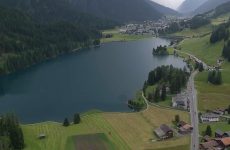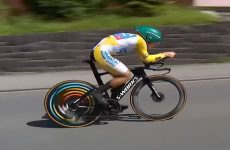Description
June 13, 2022
Tour de Suisse 2022 – Stage 2 – Küsnacht – Aesch : 198 km
There was a time when the Tour de Suisse was considered the third most prestigious stage race in the world.
Show more...
June 13, 2022
Tour de Suisse 2022 – Stage 2 – Küsnacht – Aesch : 198 km
There was a time when the Tour de Suisse was considered the third most prestigious stage race in the world. With its first edition debuting back in 1933, the week-long race has built up a rich history and has seen many of the sport’s most legendary names. The Tour de Suisse often starts with a short prologue, followed by a series of stages in the high-mountains. The race is renowned for sending riders up some of the highest altitude climbs in the sport of cycling, like the infamous Umbrail Pass – the highest paved road in Switzerland and a climb that ascends to a dizzying height of 2,501m. The race also often visits the gruelling Furka Pass and legendary St. Gotthard Pass – a road that climbs for more than 50km from some directions and features a staggering 38 switchbacks before the 2,106m-high summit. These three climbs have defined many editions over the race’s 89-year history, the most recent being that of the 2019 race – the edition won by Bernal.
Andreas Leknessund (Team DSM) fended off the peloton for an impressive solo victory in stage 2 of the Tour de Suisse.
Alberto Bettiol (EF Education-EasyPost), mistakenly thinking that Leknessund had been caught, celebrated as he claimed what was in fact a second place, with Michael Matthews (BikeExchange-Jayco) in third.
On the second-category Chellpass, late on the stage, when the 23-year-old Leknessund accelerated sharply away from a slowly disintegrating breakaway, with just 90 seconds margin on the bunch, his move had all the feel of a symbolic last-ditch gesture.
Instead, Leknessund opened his advantage to nearly two minutes by the summit and then time trialled his way down the fast sweeping descent, staying out front all the way to the finish.
Second-placed Bettiol punched his arm in the air in triumph when he crossed the line at the head of the bunch, unaware that Leknessund had already taken the day’s honours.
In fact the only rider truly to benefit from the searing pace laid down the peloton behind Leknessund was race leader Stevie Williams (Bahrain Victorious), with the 38-second gap on the former double Norwegian time trial champion small enough to ensure the Briton remained in the lead for another day.
“My objective was the stage win,” Leknessund, now fourth on GC just seven seconds behind Williams, told Swiss TV after the finish. “The hardest part of today was the climb, I thought if I got a gap, then I’d be able to stay away.
“And then in the last few kilometres, I was suffering, but I was enjoying it.”
Bettiol took his defeat in good humour, laughing when fellow Italian Matteo Trentin (UAE Team Emirates), fifth in the sprint, lifted Bettiolo’s arm again in ‘victory’ after the finish.
“I beat my Italian friend so I was still happy,” Bettiol said. “I don’t know what happened – as you can see, my radio is off – and now my friends will all be joking with me today and tomorrow.”
How it unfolded
After Sunday’s fraught finale which saw several of the GC favourites come to the fore, any expectations that a quiet stage would likely follow on Monday were quickly dashed by the ferocious pace in the first hour of racing, which averaged out at 48 kph.
Equally unusual was that the break of the day initially consisted entirely of WorldTour riders with Leknessund, Jonas Rutsch (EF Education-EasyPost), Joel Suter (UAE Team Emirates), Matt Holmes (Lotto Soudal), Michael Schär (AG2R Citroën), Matteo Badilatti (Groupama-FDJ), Leonardo Basso (Astana-Qazaqstan) and Mathieu Burgaudeau (TotalEnergies) clipping off the front.
When Simon Vitzthum and Claudio Imhof, racing for the Swiss National Cycling Team, bridged across, that ended the WorldTour hegemony in the break, but both its size and calibre meant Bahrain Victorious were going to have their work cut out keeping it under control.
And so it proved. As the terrain grew increasingly rugged and the gap stayed at between three and four minutes, the break began shedding units. Imhof was the first to go, his teammate Vitzhum suffering on the second-category Gampan, 70 kilometres from the finish, then Basso was also dropped.
However, the remaining seven stayed stubbornly out of reach, forcing other GC teams to form a working alliance with Bahrain to pull them back. Bora-Hansgrohe and Ineos Grenadiers both put their shoulder to the wheel in a notable increase of pace behind and on the third-category Elchenburg, Suter was the next to crack.
The six remaining riders – Rutsch, Holmes, Leknessund, Burgadeau, along with a struggling Schär and Badilatti – then pooled their resources to ensure they at least reached the foot of the Chellpass together. Yet the collaboration had its limits: when Leknessund launched a searing acceleration with 18 kilometres to go, such was its strength that even if he hadn’t surprised the other breakaways by attacking from the back of the move, it would have been all but impossible to get on his wheel.
With Alpecin-Fenix blasting away behind Leknessund’s chances looked to be minimal. However Leknessuand had already shown with his pacing on the Elchenburg he was likely the strongest of the break and the Chelpasss steady, well-surfaced slopes were perfect for a time triallist like the Norwegian to perform at peak potential.
Although the peloton was able to make some inroads (and save Williams lead in the process), coming off the climb Leknessund delivered a faultless high-speed descent, tucking into a classic aero’ position and then taking each of the corners without any errors or hesitation. He only slowed, in fact, when in sight of the finish, soaking up the applause for a memorably classy first WorldTour victory, and DSM’s fourth of the season.
Results :



























